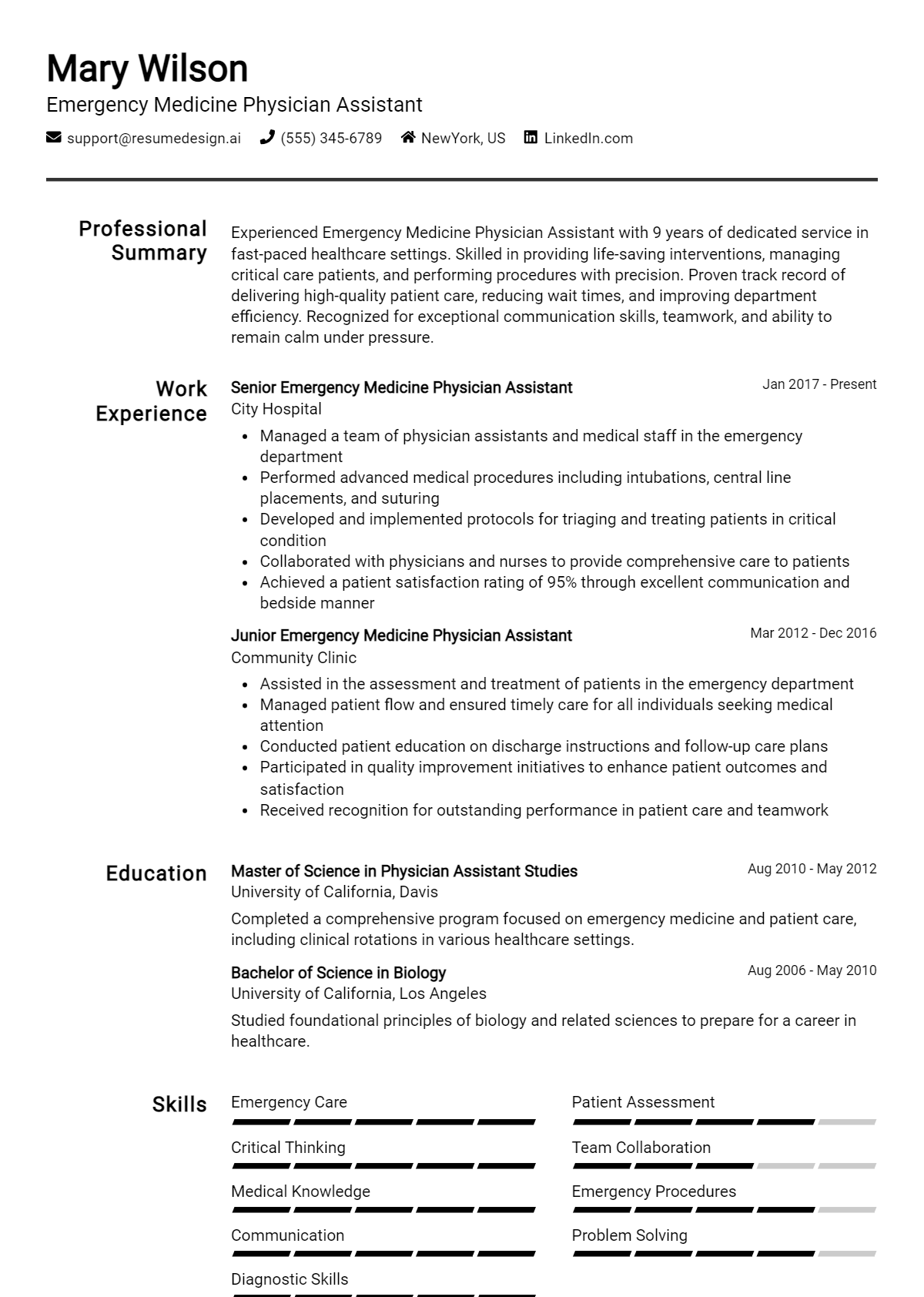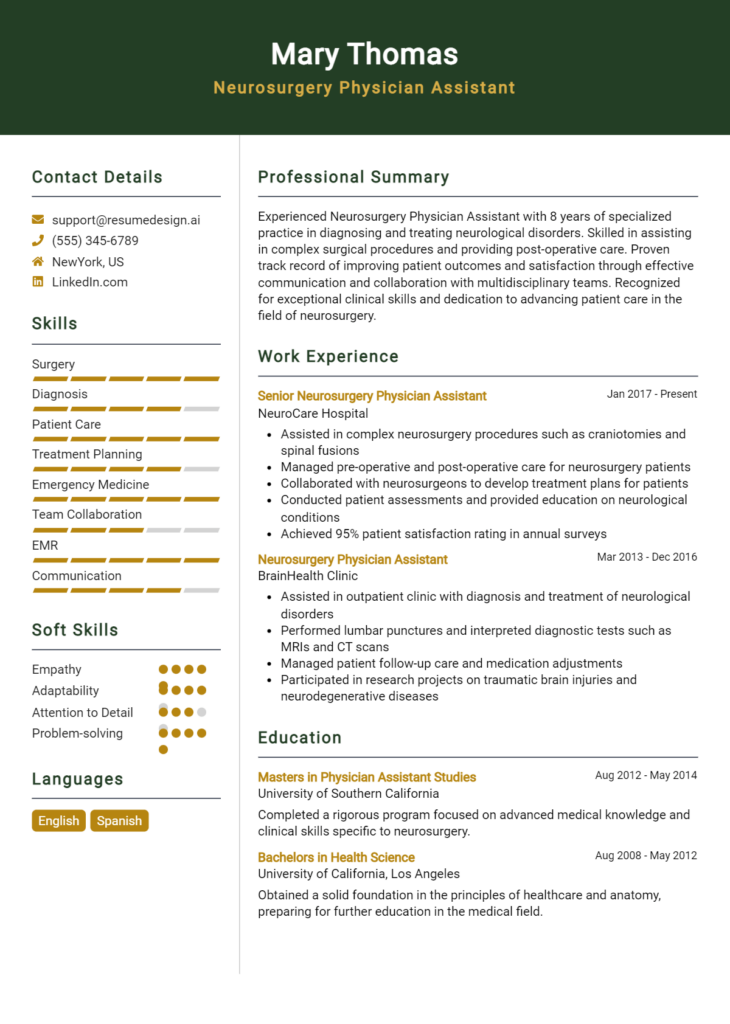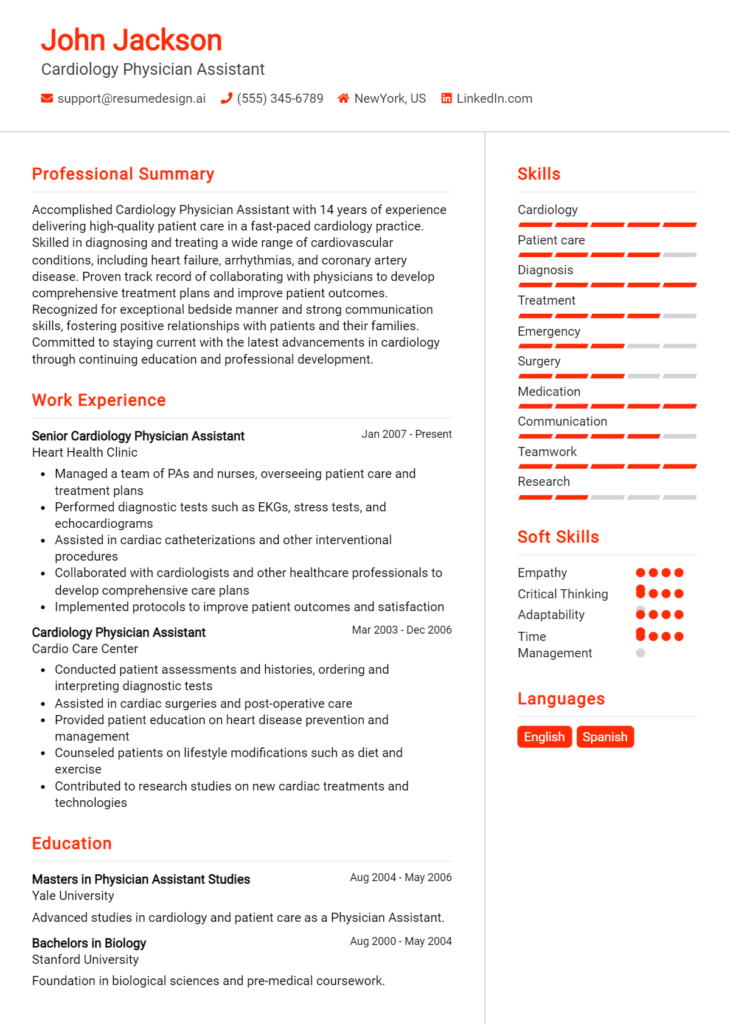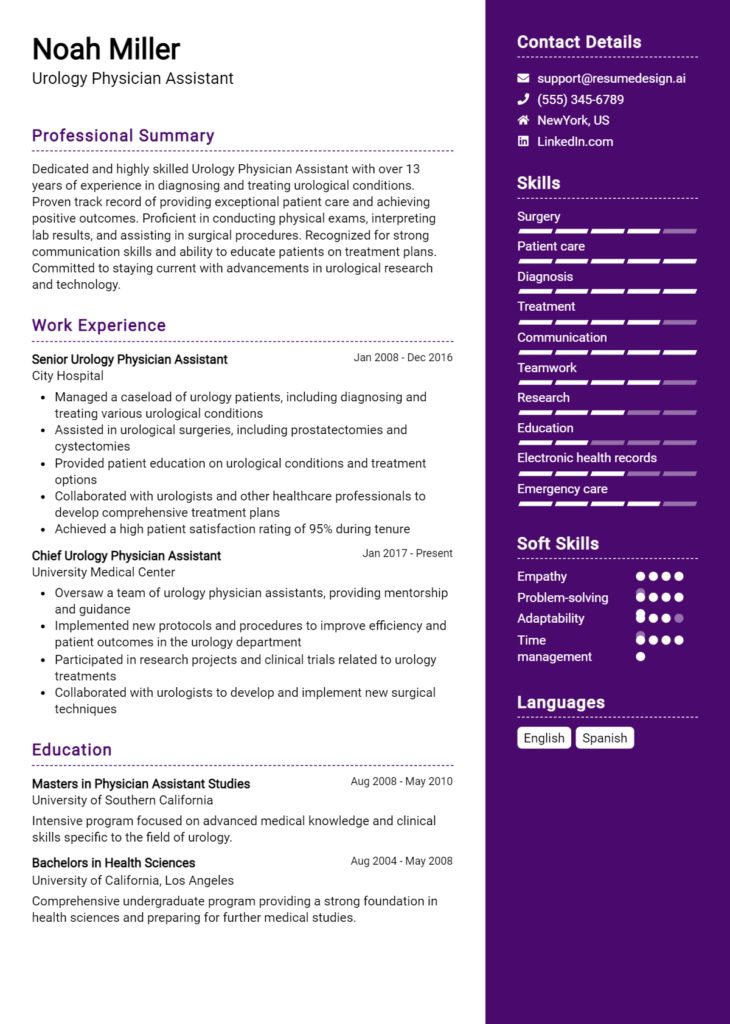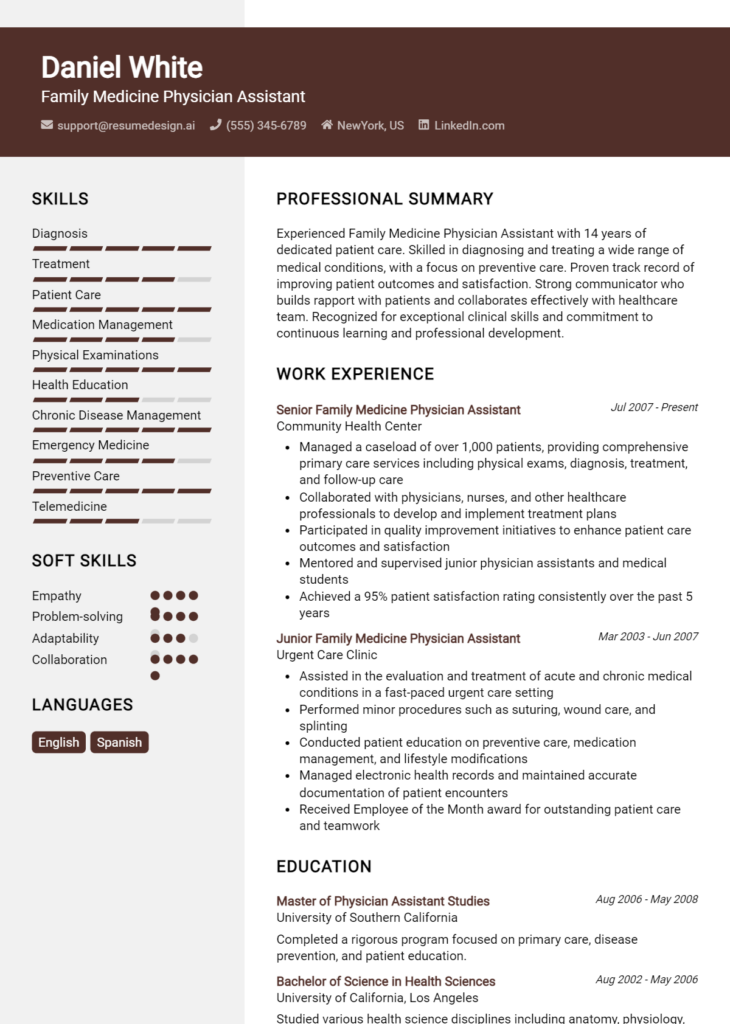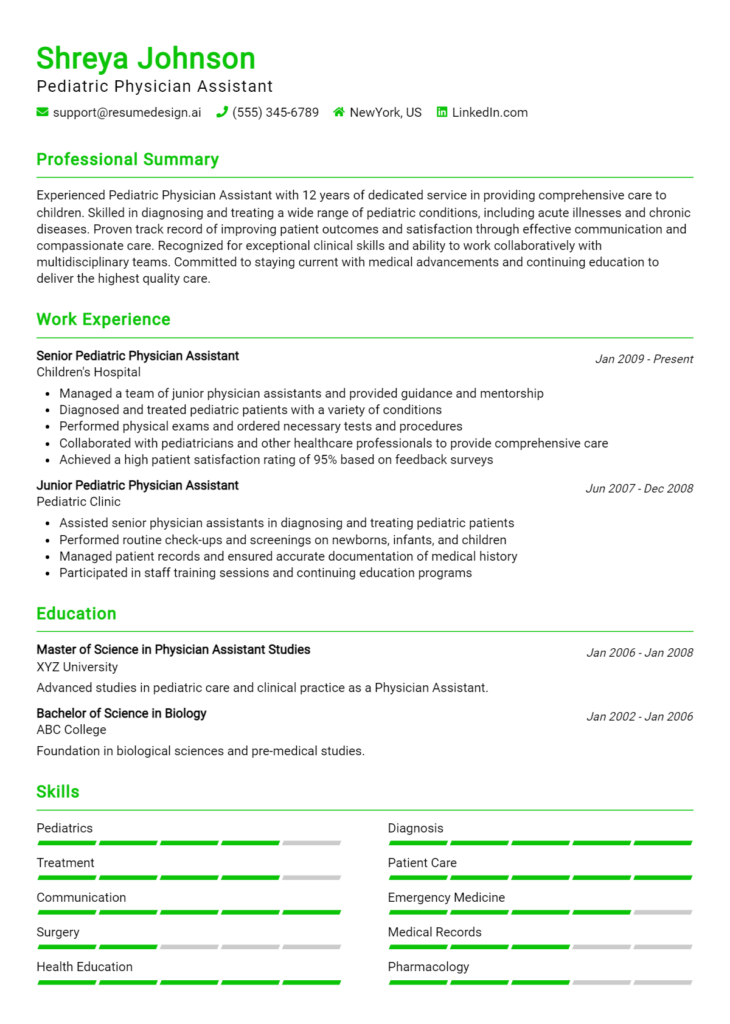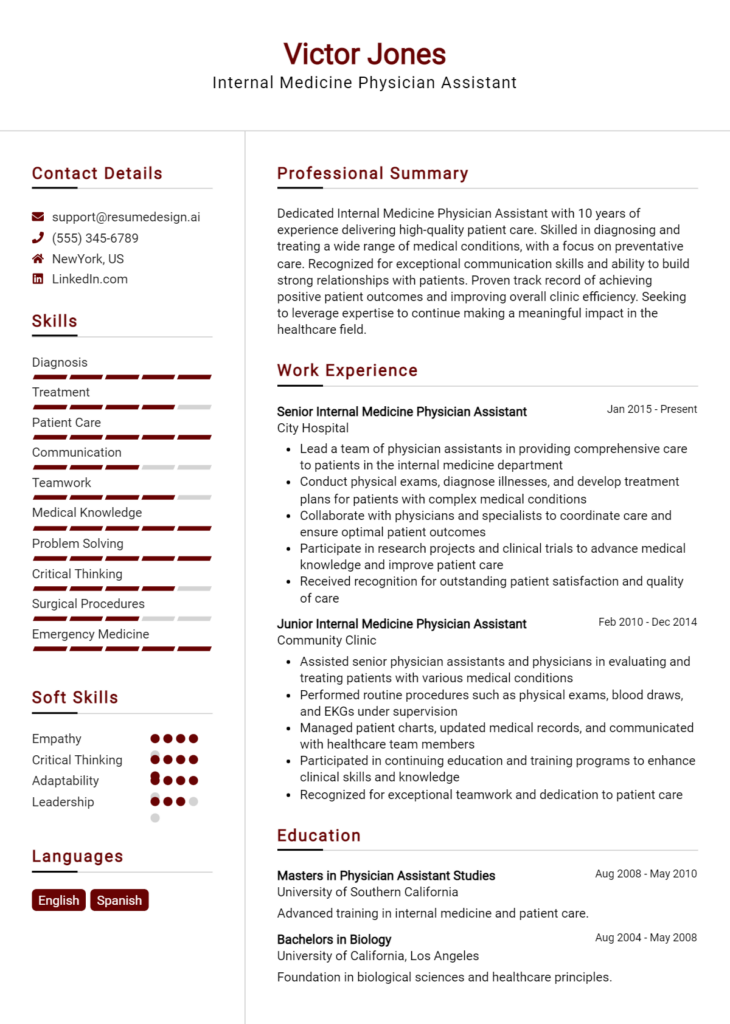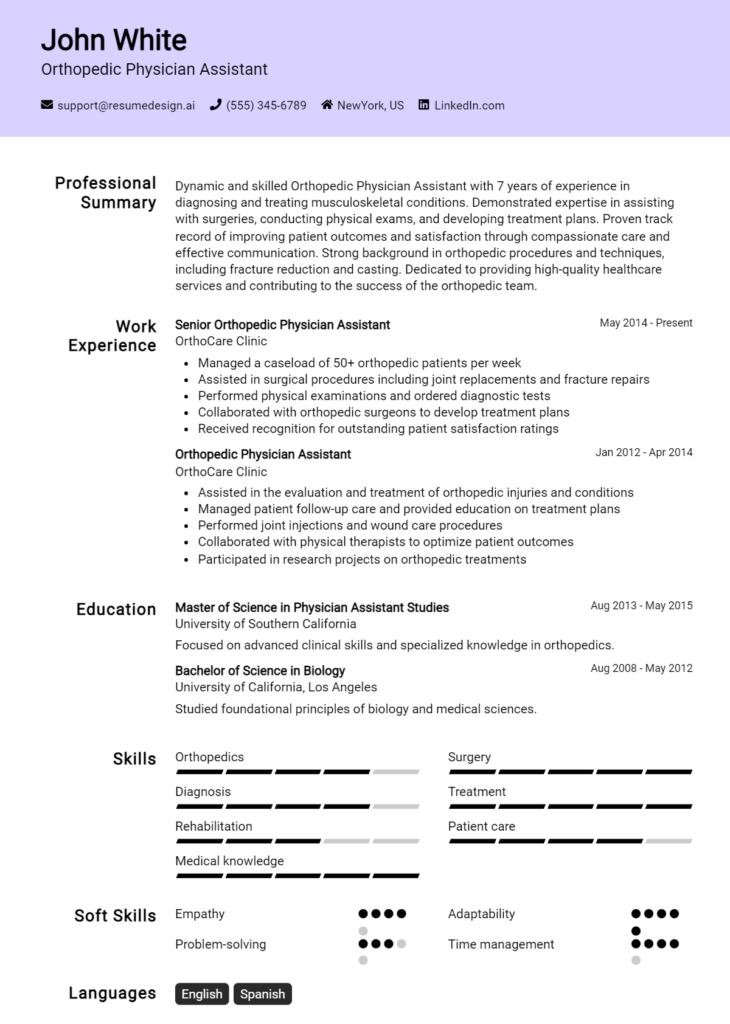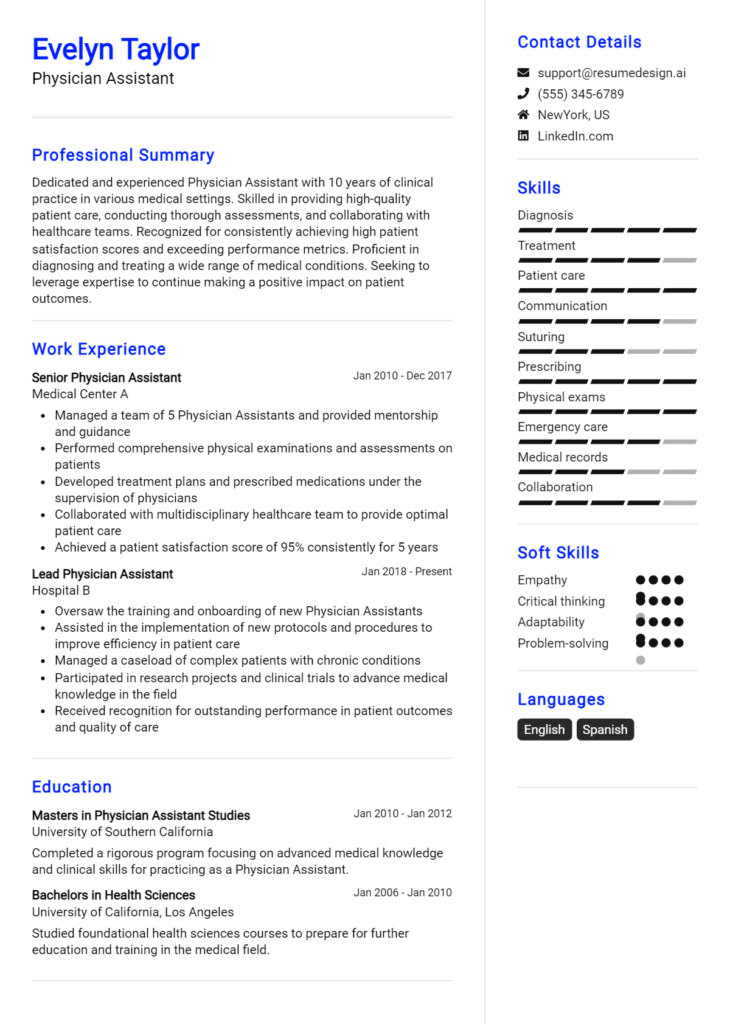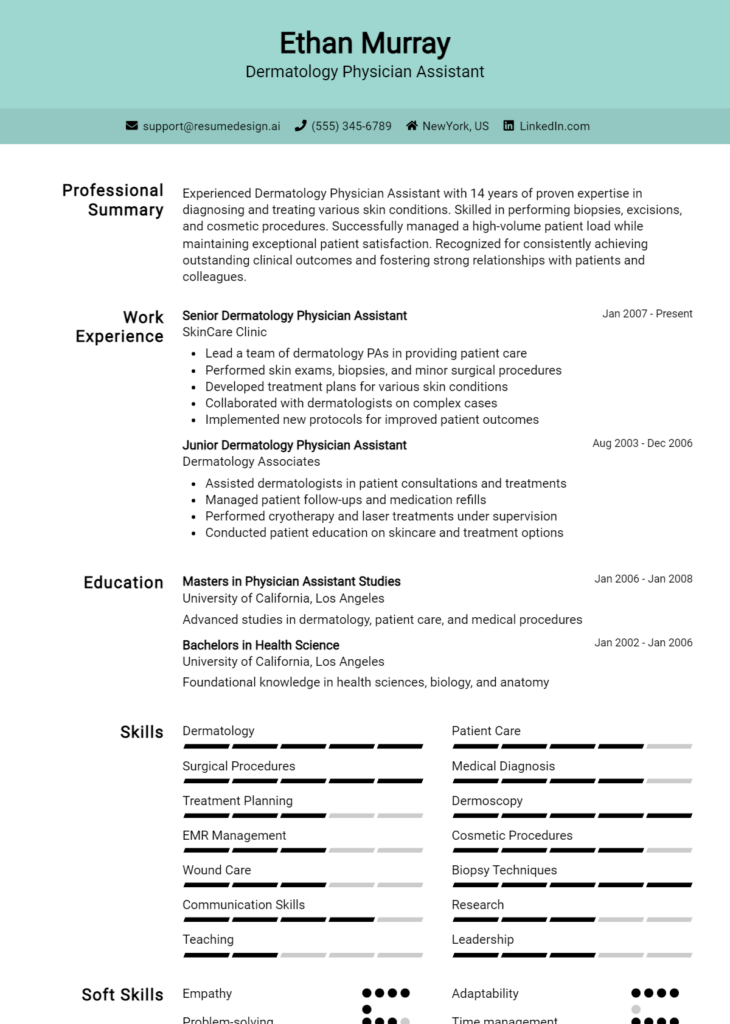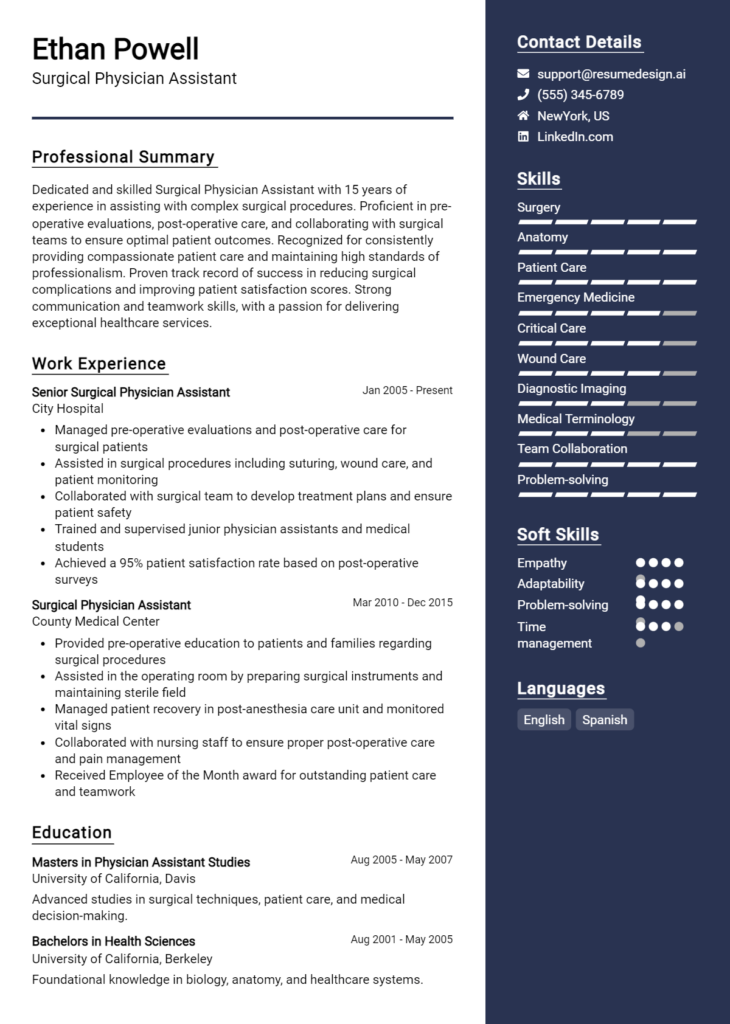Emergency Medicine Physician Assistant Core Responsibilities
Emergency Medicine Physician Assistants play a crucial role in patient care, bridging various departments by collaborating with physicians, nurses, and specialists. Their core responsibilities include conducting patient assessments, diagnosing conditions, and implementing treatment plans in high-pressure environments. Successful candidates possess strong technical skills, operational knowledge, and exceptional problem-solving abilities, ensuring timely and effective care. These competencies significantly contribute to the organization’s overall goals, emphasizing the need for a well-structured resume to effectively showcase these qualifications.
Common Responsibilities Listed on Emergency Medicine Physician Assistant Resume
- Conduct thorough patient assessments and histories.
- Perform diagnostic procedures and interpret results.
- Assist in emergency procedures and surgeries.
- Administer medications and monitor patient responses.
- Collaborate with healthcare teams to develop treatment plans.
- Educate patients and families on health management.
- Document patient care and maintain accurate records.
- Manage patient flow and prioritize emergency cases.
- Participate in quality improvement initiatives.
- Provide support during trauma and critical care situations.
- Stay updated on medical procedures and technology.
- Assist with patient discharge planning and follow-up care.
High-Level Resume Tips for Emergency Medicine Physician Assistant Professionals
In the competitive field of emergency medicine, a well-crafted resume is not just a document; it is your first opportunity to make a lasting impression on potential employers. As an Emergency Medicine Physician Assistant, your resume must effectively showcase your unique skills, experiences, and achievements to stand out in a crowded job market. This is your chance to demonstrate your expertise in fast-paced environments and your ability to deliver high-quality patient care. This guide will provide practical and actionable resume tips specifically tailored for Emergency Medicine Physician Assistant professionals, ensuring that your resume reflects your qualifications and sets you apart from the competition.
Top Resume Tips for Emergency Medicine Physician Assistant Professionals
- Tailor your resume to the job description by incorporating relevant keywords and phrases that align with the specific requirements of the position.
- Highlight your clinical experience in emergency settings, emphasizing any rotations, internships, or work history in urgent care or trauma units.
- Quantify your achievements, such as the number of patients seen per shift or the outcomes of specific interventions you facilitated.
- Showcase industry-specific skills, including proficiency in advanced medical procedures, emergency protocols, and technology used in emergency medicine.
- Include certifications and licenses relevant to the role, such as BLS, ACLS, or specialty certifications in emergency medicine.
- Utilize a clear and organized format that allows key information to stand out, making it easy for hiring managers to quickly assess your qualifications.
- Incorporate a professional summary at the top of your resume that succinctly captures your career goals and key competencies.
- Keep your resume concise, ideally one page, focusing on the most relevant and impactful experiences.
- Use action verbs to describe your responsibilities and achievements, creating a dynamic and engaging narrative about your professional journey.
- Proofread carefully for any errors in grammar, spelling, or formatting to present a polished and professional image.
By implementing these tips, you can significantly increase your chances of landing a job in the Emergency Medicine Physician Assistant field. A well-optimized resume will not only highlight your qualifications but also demonstrate your commitment to excellence in patient care, making you an attractive candidate to potential employers.
Why Resume Headlines & Titles are Important for Emergency Medicine Physician Assistant
In the competitive field of emergency medicine, a well-crafted resume headline or title serves as the first impression a candidate makes on hiring managers. For an Emergency Medicine Physician Assistant, this brief phrase can encapsulate vital qualifications, professional strengths, and relevant experience, significantly influencing the selection process. A strong headline not only grabs attention but also provides a concise summary of what the candidate brings to the table, ensuring that key attributes are communicated immediately. It should be directly related to the job being applied for, making it easier for hiring managers to recognize the candidate's suitability for the position.
Best Practices for Crafting Resume Headlines for Emergency Medicine Physician Assistant
- Keep it concise: Aim for one impactful sentence that summarizes your qualifications.
- Be role-specific: Use terminology that reflects the Emergency Medicine Physician Assistant role.
- Highlight key skills: Incorporate essential skills that are in demand for the position.
- Use action words: Start with strong verbs to convey your proactive approach.
- Include relevant experience: Mention years of experience or specific areas of expertise.
- Tailor to the job: Customize your headline for each application to match the job description.
- Showcase certifications: If applicable, include any relevant certifications or credentials.
- Make it compelling: Use language that engages the reader and piques their interest.
Example Resume Headlines for Emergency Medicine Physician Assistant
Strong Resume Headlines
Dedicated Emergency Medicine Physician Assistant with 5+ Years of Experience in High-Pressure Environments
Compassionate PA Specializing in Trauma Care and Patient Management in Emergency Settings
Experienced Emergency Medicine PA with Advanced Certification in ACLS and PALS
Results-Driven Physician Assistant with Proven Track Record in Emergency Response and Patient Care
Weak Resume Headlines
Physician Assistant Looking for a Job
Emergency Medicine Professional Seeking Opportunities
The strong headlines stand out because they provide specific insights into the candidate's skills, experience, and professional focus, instantly aligning with the priorities of hiring managers. In contrast, the weak headlines are vague and lack detail, failing to convey any unique qualifications or value propositions. This lack of specificity can cause candidates to be overlooked in favor of those who present themselves more assertively and clearly through impactful headlines.
Writing an Exceptional Emergency Medicine Physician Assistant Resume Summary
A resume summary is a crucial element for an Emergency Medicine Physician Assistant, serving as the first impression on hiring managers. It succinctly encapsulates the candidate's key skills, relevant experience, and notable accomplishments, enabling employers to quickly assess suitability for the role. A strong summary is concise yet impactful, tailored specifically to the job description, and highlights the candidate's value proposition in a way that resonates with the demands of emergency medicine. This initial snapshot can significantly influence the decision-making process, making it imperative to craft an exceptional summary that stands out.
Best Practices for Writing a Emergency Medicine Physician Assistant Resume Summary
- Quantify achievements where possible, such as patient outcomes or efficiency improvements.
- Focus on relevant skills, including clinical competencies and emergency response capabilities.
- Tailor the summary to match the specific job description and requirements.
- Use action-oriented language to convey a sense of proactivity and results-driven mindset.
- Highlight any specialized training or certifications relevant to emergency medicine.
- Keep it concise, ideally within 2-4 sentences, to maintain reader engagement.
- Incorporate keywords from the job posting to enhance alignment with employer expectations.
- Showcase a blend of clinical expertise and interpersonal skills, crucial for patient care in emergencies.
Example Emergency Medicine Physician Assistant Resume Summaries
Strong Resume Summaries
Compassionate Emergency Medicine Physician Assistant with over 5 years of experience in fast-paced ER settings, successfully managing over 1,000 patient cases annually and achieving a 95% patient satisfaction rate. Certified in ACLS and PALS, with a focus on trauma care and rapid assessment skills.
Dynamic PA with a proven record of improving patient throughput by 30% in a Level 1 Trauma Center, utilizing advanced triage techniques and effective team collaboration. Holds a Master’s degree in Physician Assistant Studies and is committed to delivering high-quality emergency care.
Dedicated Emergency Medicine Physician Assistant with expertise in urgent care protocols, having performed over 500 procedures including intubations and laceration repairs. Recognized for exceptional communication skills and a strong ability to work under pressure, ensuring optimal patient outcomes.
Weak Resume Summaries
Experienced Physician Assistant looking for an emergency medicine position. I have worked in healthcare for several years and have many skills.
Emergency Medicine PA with some experience. I am interested in a challenging role and am eager to learn more about emergency medicine.
The examples provided illustrate the distinct differences between strong and weak resume summaries. Strong summaries are specific, quantifiable, and directly relevant to the role, demonstrating the candidate's tangible impact in previous positions. In contrast, weak summaries are vague, lacking in detail, and do not provide any measurable outcomes or unique qualifications, making it difficult for hiring managers to gauge the candidate's fit for the position.
Work Experience Section for Emergency Medicine Physician Assistant Resume
The work experience section of an Emergency Medicine Physician Assistant resume is crucial as it serves as a comprehensive showcase of the candidate's technical skills, leadership abilities, and commitment to delivering high-quality patient care. This section provides potential employers with insights into the candidate's hands-on experience in emergency settings, demonstrating their capability to manage teams effectively while adhering to industry standards. Quantifying achievements—such as the number of patients treated, improvements in patient outcomes, or reductions in wait times—can significantly enhance the impact of this section, making it imperative to align experiences with industry benchmarks.
Best Practices for Emergency Medicine Physician Assistant Work Experience
- Highlight specific technical skills relevant to emergency medicine, such as trauma assessment and critical care procedures.
- Quantify achievements by including metrics like patient load, successful interventions, or efficiency improvements.
- Emphasize collaboration with multidisciplinary teams to illustrate teamwork and communication skills.
- Use active language and strong action verbs to convey responsibility and impact.
- Tailor work experience descriptions to align with job descriptions and industry standards.
- Include any leadership roles or responsibilities that demonstrate your ability to manage teams and mentor others.
- Incorporate examples of continuous education or training that enhance your technical expertise.
- Provide context for each role, such as the type of facility and the patient demographics you served.
Example Work Experiences for Emergency Medicine Physician Assistant
Strong Experiences
- Led a team of 5 physician assistants in a Level I trauma center, improving patient throughput by 30% over one year through streamlined triage protocols.
- Conducted over 1,000 emergency evaluations, achieving a patient satisfaction score of 95% while maintaining an average patient wait time of 20 minutes.
- Implemented a new electronic medical record system that reduced documentation errors by 40% and enhanced communication among healthcare providers.
- Collaborated with a multidisciplinary team to develop a pain management protocol that resulted in a 25% decrease in opioid prescriptions.
Weak Experiences
- Worked in an emergency department assisting with various tasks.
- Responsible for patient care in a busy hospital setting.
- Participated in team meetings and provided input on patient care strategies.
- Completed duties as assigned in the emergency room.
The examples labeled as strong experiences are considered effective because they detail specific accomplishments, quantify results, and highlight leadership and collaboration in a measurable way. In contrast, the weak experiences lack detail and do not convey the candidate's contributions or impact on patient care or team dynamics, making them less compelling to potential employers.
Education and Certifications Section for Emergency Medicine Physician Assistant Resume
The education and certifications section of an Emergency Medicine Physician Assistant resume is crucial for showcasing the candidate's academic achievements and professional qualifications. This section not only reflects the rigorous training and knowledge that an applicant has acquired but also emphasizes their commitment to continuous learning and excellence in the medical field. By detailing relevant coursework, industry-recognized certifications, and specialized training, candidates can significantly enhance their credibility and demonstrate how they align with the expectations of the role. A well-structured education and certifications section can serve as a powerful testament to a candidate's preparedness for the challenges of emergency medicine.
Best Practices for Emergency Medicine Physician Assistant Education and Certifications
- Include only relevant degrees and certifications that pertain to emergency medicine.
- Use specific terminology and keywords that align with the job description.
- Highlight advanced certifications such as ACLS, PALS, or ATLS to demonstrate specialization.
- Provide details of coursework or training that directly relates to emergency care.
- List the most recent education first to show the progression of your qualifications.
- Consider including continuing education courses to showcase a commitment to lifelong learning.
- Be concise yet detailed in listing certifications, including issuing organizations and expiration dates.
- Ensure that all information is accurate and up-to-date to maintain credibility.
Example Education and Certifications for Emergency Medicine Physician Assistant
Strong Examples
- Master of Physician Assistant Studies, University of Southern California, 2021
- Certification: National Commission on Certification of Physician Assistants (NCCPA), 2021
- Advanced Cardiac Life Support (ACLS), American Heart Association, 2023
- Pediatric Advanced Life Support (PALS), American Heart Association, 2023
Weak Examples
- Bachelor of Arts in Psychology, State University, 2010
- Certification: Basic Life Support (BLS), expired 2021
- General Medical Assistant Training, Online Course, 2015
- High School Diploma, Central High School, 2005
The strong examples are considered effective as they directly relate to the qualifications necessary for an Emergency Medicine Physician Assistant, showcasing relevant degrees and certifications that emphasize specialized training in emergency care. In contrast, the weak examples lack relevance to the role, including outdated or unrelated qualifications that do not reflect the candidate’s readiness for the demands of emergency medicine. Ensuring that educational and certification information is pertinent and current is vital for making a strong impression in this competitive field.
Top Skills & Keywords for Emergency Medicine Physician Assistant Resume
In the highly dynamic and demanding field of emergency medicine, the role of a Physician Assistant (PA) is crucial for delivering timely and effective patient care. Crafting a compelling resume that highlights both technical and interpersonal skills is essential for standing out among candidates. Employers seek PAs who not only possess the necessary medical knowledge but also demonstrate strong communication, problem-solving, and teamwork abilities. A well-structured resume that emphasizes relevant skills can significantly enhance your chances of securing an interview, allowing you to showcase your qualifications and readiness for the challenges of emergency care.
Top Hard & Soft Skills for Emergency Medicine Physician Assistant
Soft Skills
- Strong communication skills
- Team collaboration
- Adaptability under pressure
- Empathy and compassion
- Critical thinking
- Attention to detail
- Time management
- Conflict resolution
- Patient education
- Cultural competence
- Active listening
- Stress management
- Decision-making
- Emotional intelligence
- Organizational skills
Hard Skills
- Advanced cardiac life support (ACLS)
- Basic life support (BLS)
- Trauma assessment and management
- Medical history taking
- Diagnostic imaging interpretation
- Wound care and suturing
- Pharmacology knowledge
- Emergency procedures (e.g., intubation, chest tube placement)
- Electronic health record (EHR) proficiency
- Laboratory test interpretation
- Infection control practices
- Patient triage
- Clinical assessment techniques
- Medical coding and billing
- Knowledge of emergency protocols and guidelines
By incorporating these essential skills into your resume, along with a solid work experience section, you can effectively demonstrate your qualifications and readiness to thrive in the challenging environment of emergency medicine.
Stand Out with a Winning Emergency Medicine Physician Assistant Cover Letter
Dear Hiring Manager,
I am writing to express my interest in the Emergency Medicine Physician Assistant position at [Hospital/Clinic Name]. With a robust clinical background and a strong commitment to providing high-quality emergency care, I am excited about the opportunity to contribute to your esteemed team. My extensive training and hands-on experience in fast-paced environments have equipped me with the skills necessary to thrive in emergency medicine, where quick decision-making and effective patient management are paramount.
During my clinical rotations, I have had the privilege of working in various emergency departments, where I honed my ability to assess, diagnose, and initiate treatment for a diverse range of medical conditions. I am proficient in performing procedures such as suturing, intubation, and wound care, and I am adept at working collaboratively with physicians, nurses, and other healthcare professionals to ensure optimal patient outcomes. My experience in triaging patients has allowed me to enhance my critical thinking skills and prioritize care effectively, always with the goal of delivering compassionate and efficient service to those in need.
Furthermore, my passion for emergency medicine is driven by my desire to make a meaningful impact during some of the most challenging moments in patients' lives. I am committed to staying current with the latest advancements in emergency care and continuously seek opportunities for professional development. I believe that my proactive approach, combined with my ability to remain calm under pressure, positions me as a valuable asset to your team.
I am eager to bring my skills and dedication to [Hospital/Clinic Name] and contribute to the high standards of emergency care for which you are known. Thank you for considering my application. I look forward to the opportunity to discuss how I can support your mission and provide exceptional care to your patients.
Sincerely,
[Your Name]
[Your Contact Information]
Common Mistakes to Avoid in a Emergency Medicine Physician Assistant Resume
When crafting a resume for the role of an Emergency Medicine Physician Assistant (EM PA), it’s crucial to present a clear and compelling narrative of your qualifications and experience. However, many candidates make common mistakes that can hinder their chances of landing an interview. By avoiding these pitfalls, you can ensure that your resume stands out positively to hiring managers in the fast-paced realm of emergency medicine.
Neglecting to Tailor the Resume: Failing to customize your resume for specific job descriptions can lead to missed opportunities. Highlight relevant skills and experiences that align with the requirements of the position.
Excessive Length: While it’s important to provide comprehensive information, overly lengthy resumes can overwhelm recruiters. Aim for a concise format that focuses on the most pertinent details—ideally one page for early-career professionals.
Lack of Quantifiable Achievements: Many applicants list duties without illustrating their impact. Use metrics to demonstrate your contributions, such as patient outcomes or efficiency improvements.
Ignoring Keywords: Emergency medicine job postings often contain specific keywords. Failing to incorporate these terms can result in your resume being overlooked by applicant tracking systems (ATS).
Omitting Relevant Certifications: Certifications such as BLS, ACLS, and PALS are essential for EM PAs. Ensure these are prominently displayed to showcase your qualifications.
Poor Formatting: A cluttered or unprofessional layout can detract from your qualifications. Use clear headings, bullet points, and a professional font to enhance readability.
Writing in Passive Voice: Passive language can make your achievements sound less impactful. Utilize active voice to convey confidence and assertiveness in your experiences.
Neglecting Continuing Education: In the rapidly evolving field of emergency medicine, it’s vital to demonstrate ongoing education. Omitting recent courses, workshops, or training can suggest a lack of commitment to professional growth.
Conclusion
As we conclude our exploration of the Emergency Medicine Physician Assistant role, it's essential to highlight the critical skills and qualifications that employers seek. This position demands a strong foundation in medical knowledge, the ability to perform under pressure, excellent communication skills, and a commitment to patient care. Additionally, familiarity with emergency protocols and the ability to work collaboratively in a fast-paced environment are paramount.
To position yourself as a competitive candidate in this field, ensure your resume effectively showcases your relevant experience, education, and certifications. Tailoring your resume to reflect the specific requirements of the Emergency Medicine Physician Assistant role can significantly enhance your chances of securing an interview.
Now is the perfect time to review your Emergency Medicine Physician Assistant resume and make any necessary updates. Utilize available resources to strengthen your application. Explore resume templates to find a design that fits your style, or try the resume builder for a user-friendly experience in crafting your resume. For inspiration, check out resume examples that highlight successful candidate profiles. Don’t forget to enhance your application with a compelling cover letter by using cover letter templates.
Take action today and ensure your resume stands out in the competitive field of emergency medicine!

